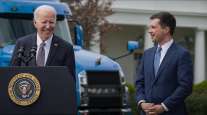Bloomberg News
Dems to Push Clean Energy Tax Breaks in Infrastructure Plan

[Stay on top of transportation news: Get TTNews in your inbox.]
A key House lawmaker unveiled plans to pursue tax breaks for renewable energy as a way to ease the shift away from fossil fuels in President Joe Biden’s upcoming infrastructure bill.
“Transitioning away from fossil fuels is going to require some tax incentives,” House Ways and Means Chairman Richard Neal, a Massachusetts Democrat, said Feb. 12 at a virtual tax policy event.
The administration has already started engaging with top lawmakers on Biden’s economic rebuilding program — his longer-term follow-up to the COVID-19 relief package. The $1.9 trillion aid bill is currently moving through the House, and Biden is expected to unveil his second initiative later this month; some economists see it weighing in at $2 trillion.

Neal
Neal said he’s looking at tax incentives for clean energy and renewable technologies, an approach that dovetails with Biden’s campaign promises to boost subsidies for green investments, energy efficiency and electric vehicles. Biden also has directed federal agencies to stop subsidizing fossil fuels and plans to ask Congress to zero-out oil and gas industry incentives.
“I don’t think the federal government should give handouts to Big Oil to the tune of $40 billion in fossil-fuel subsidies,” Biden said Jan. 27.
A likely Democratic objective is expanding a tax credit currently valued at as much as $7,500 for the purchase of an electric vehicle, such as those made by Tesla Inc. and Ford Motor Co. Automakers have encouraged lawmakers to expand the incentive by lifting a per-manufacturer cap on available credits.
Lawmakers also may restructure the credit to better target it to lower-income motorists and ensure its benefits don’t flow mostly to wealthy Americans; that could come in the form of a phase-out for higher-income taxpayers.
Existing tax credits help support construction of energy-efficient commercial buildings, wind farms and solar arrays, as well as the capture of carbon dioxide. But some clean-energy advocates have asked Congress for tax incentives to better support the development of large, grid-scale power-storage systems that can help bolster intermittent renewable energy production.

Capito
Neal said he believes that an infrastructure bill could get bipartisan support. That’s a view shared by Republican Sen. Shelley Moore Capito of West Virginia, who was one of several lawmakers to meet with Biden about infrastructure on Feb. 11.
“The president listens. He’s interested in a give-and-take,” Capito, the top GOP member of the Senate Committee on Environment and Public Works, told reporters after the meeting. “It’s been very sincere and very clear. No promises made, but he knows that our committee could work.“
Capito said the lawmakers are still discussing how to pay for such a plan, a challenge that’s halted infrastructure talks in the past. Lawmakers have resisted increasing the tax on gasoline, which since 1993 flows to the Highway Trust Fund, and the scope of the plan will likely require other tax hikes, including on U.S. businesses and their foreign profits.
Neal signaled that any tax increases wouldn’t immediately go into effect, citing the continuing COVID-19 crisis.
“We need to put the pandemic and the recession behind us before we have this conversation,” he said.
Want more news? Listen to today's daily briefing below or go here for more info:




